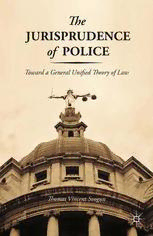
The Jurisprudence of Police: Toward a General Unified Theory of Law PDF
Preview The Jurisprudence of Police: Toward a General Unified Theory of Law
T he J urisprudence of P olice This page intentionally left blank T he J urisprudence of P olice Toward a General Unified Theory of Law Thomas Vincent Svogun THE JURISPRUDENCE OF POLICE Copyright © Thomas Vincent Svogun, 2013. Softcover reprint of the hardcover 1st edition 2013 978-1-137-36623-8 All rights reserved. First published in 2013 by PALGRAVE MACMILLAN® in the United States— a division of St. Martin’s Press LLC, 175 Fifth Avenue, New York, NY 10010. Where this book is distributed in the UK, Europe and the rest of the world, this is by Palgrave Macmillan, a division of Macmillan Publishers Limited, registered in England, company number 785998, of Houndmills, Basingstoke, Hampshire RG21 6XS. Palgrave Macmillan is the global academic imprint of the above companies and has companies and representatives throughout the world. Palgrave® and Macmillan® are registered trademarks in the United States, the United Kingdom, Europe and other countries. ISBN 978-1-349-47407-3 ISBN 978-1-137-34263-8 (eBook) DOI 10.1057/9781137342638 Library of Congress Cataloging-in-Publication Data Svogun, Thomas Vincent. The jurisprudence of police : toward a general unifi ed theory of law / Thomas Vincent Svogun. pages cm 1. Police. 2. Jurisprudence. 3. Justice, Administration of. I. Title. HV7921.S86 2013 344.05(cid:2)201—dc23 2013017360 A catalogue record of the book is available from the British Library. Design by Newgen Knowledge Works (P) Ltd., Chennai, India. First edition: October 2013 10 9 8 7 6 5 4 3 2 1 To my wonderful wife, Margaret, and our splendid sons, Daniel and Nathaniel This page intentionally left blank C ontents Preface ix Acknowledgments x iii Introduction 1 Part I The Need for an Integrative Jurisprudence of Police 1 The Jurisprudence of Police Defined 1 3 2 A Critique of Positivist Police Science 2 5 3 A Critique of Normative Police Theory 4 1 4 The Rise and Limits of the Formal Positive Police 6 3 5 The American Police Experience and the Limits of the Managerial Perspective 1 01 Part II Toward a General Unified Theory of Law: The Integrative Nature of Law, Law Enforcement, and the New Police 6 The New Police and Implications for a Conception of Law 1 23 7 Integrative Jurisprudence: Law and Law Enforcement’s Three Dimensions 1 35 8 The Relativity of Justice, Law, and Police to the Social Bond 1 91 9 Summation and Closing Reflections 2 07 Notes 221 Bibliography 249 Index 259 This page intentionally left blank Preface Daniel Bell observed that wisdom is “the bridge of experience and imagination over time.” 1 In the two decades or more that I have been engaged in the higher education of police, I have found that while police are intelligent and experienced, they often lack the kind of imagination on which wisdom must draw to reach insights needed by municipal administrators, lawyers, judges, legislators, social scientists, and most importantly the communities they serve. Without the cul- tivation and refinement of that imaginative faculty, disciplined by the habits of mind and heart in which law abides, the judgment the police profession brings to bear on its experience is compromised. The kind of imagination to which I refer enlarges vision and mind. When these are coupled with heart and conviction, they fire vocation. Focused as they are on the narrow details, however, police often miss the forest for the trees. Having expended considerable resources in the development of professional technique, they have, for the most part, neglected the subject of police philosophy. Bereft of a larger vision addressed to ultimate ends (which would inform the work of police as a whole and help unify it under a common professional vision), the police remain mired in a highly fragmented practice that fails to fulfill the promise of vocation. As a profession (and there has been debate over whether police rise to the level of a profession), the police are not alone in this. The nineteenth century, which saw the creation of formal police depart- ments, first in metropolitan London, witnessed as well the emer- gence of modern professions and the establishment of a professional ethos that bracketed questions of ultimate ends, or t eloi , and focused instead on means. The new professions came to be evaluated by cri- teria developed by the new positivist social sciences, focused as well on means. Law itself, largely through the influence of legal positivism, was reduced to a set of techniques for enforcing the sovereign’s will, contributing to what the late Harold Berman called “a crisis in our legal tradition” and contributing as well to the declining standards of the legal profession.2
